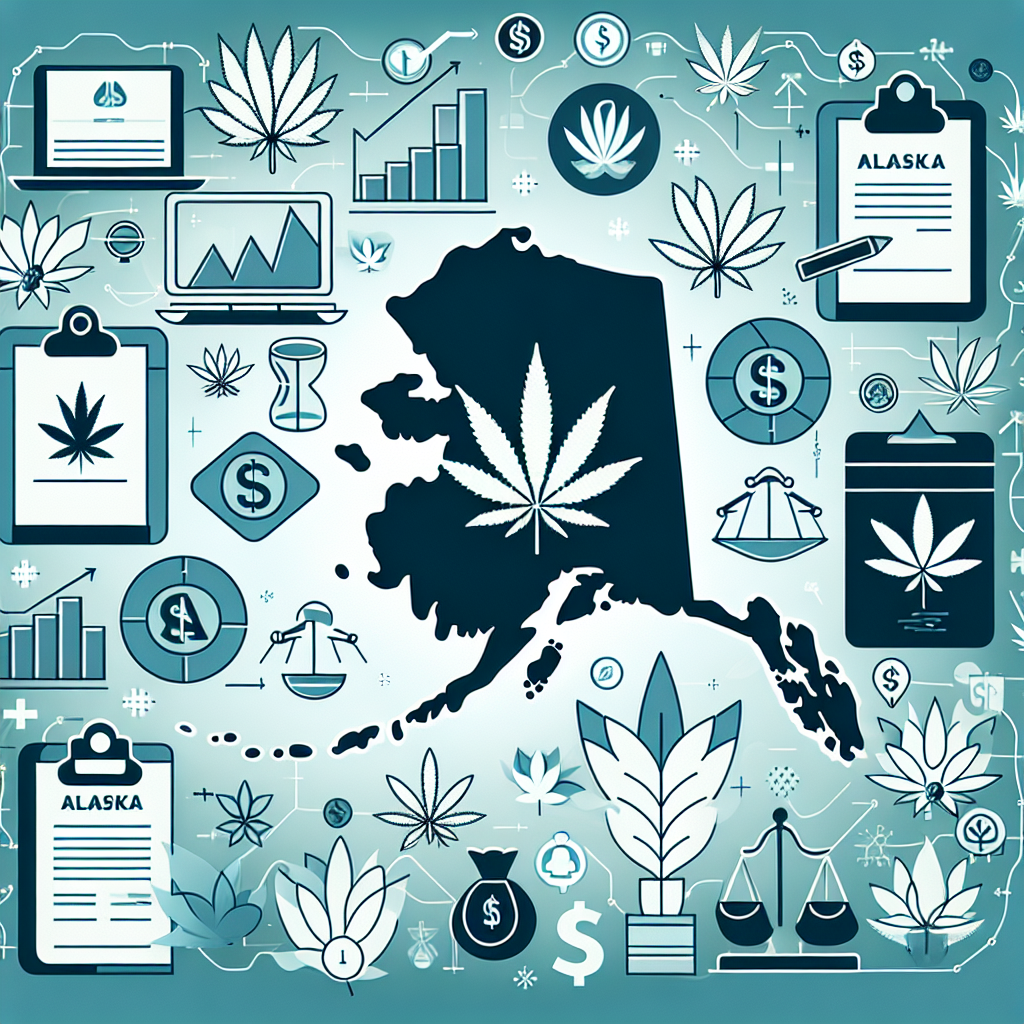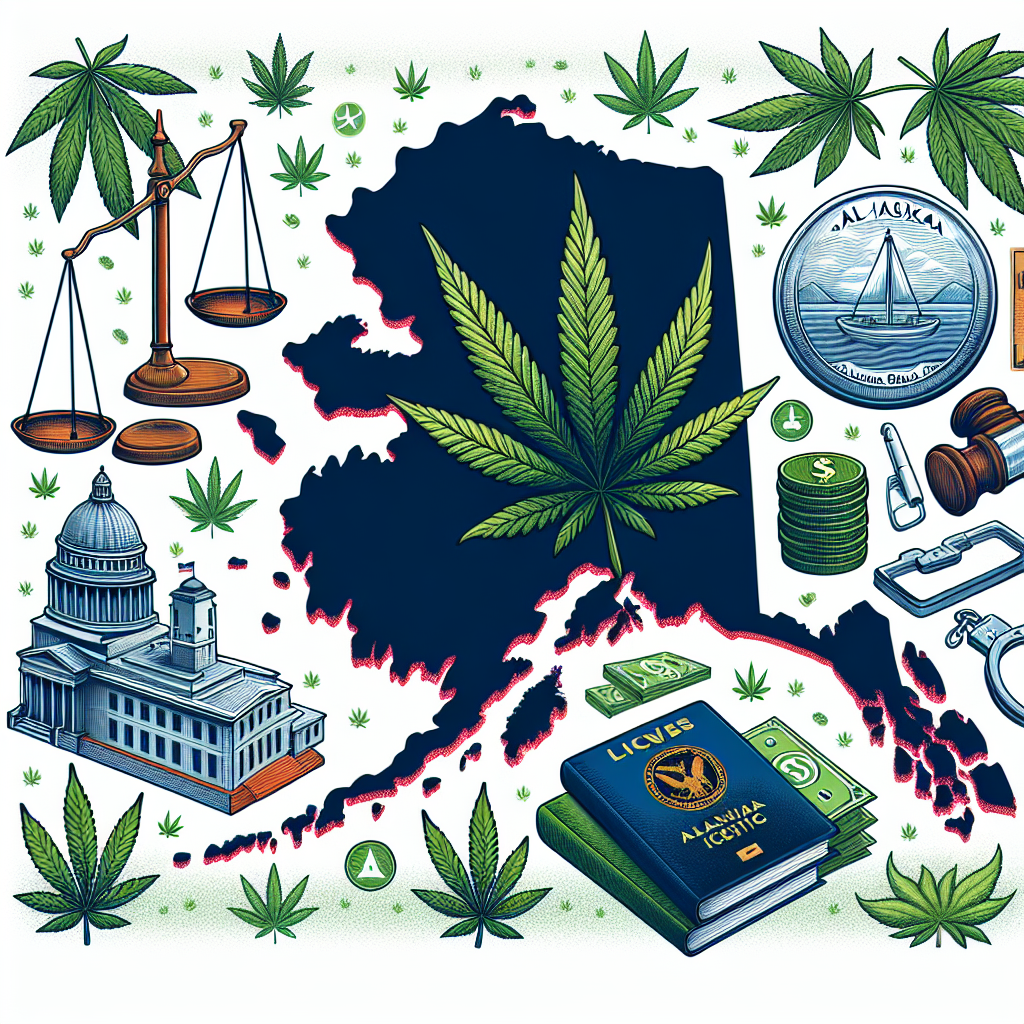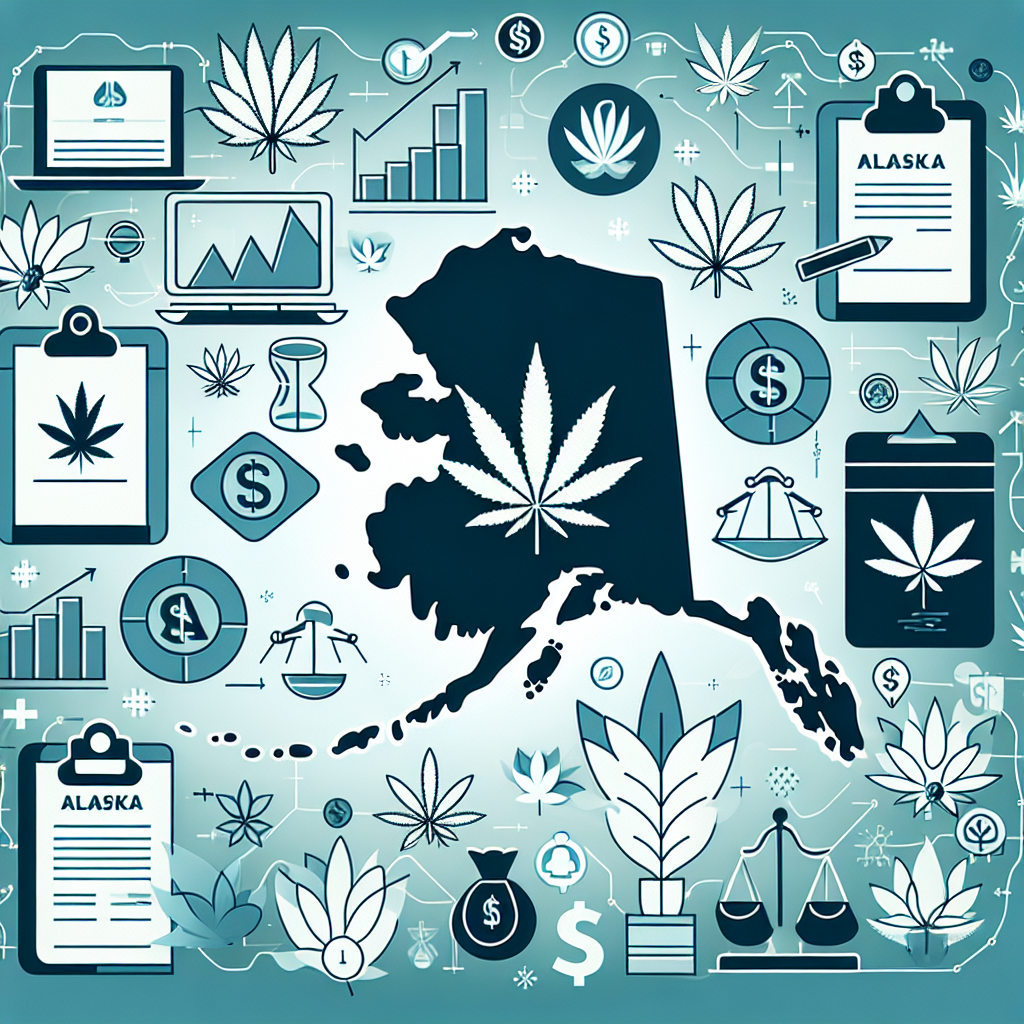Alaska, the beautiful frontier state known for its stunning landscapes and unique wildlife, is not only a haven for nature enthusiasts but also a trailblazer in cannabis legislation. In this article, you will discover an in-depth overview of the cannabis laws in Alaska. From the legalization of recreational marijuana to the regulations surrounding possession and cultivation, we will explore the nuances and intricacies that shape the current cannabis landscape in the Last Frontier. Whether you’re a curious traveler or a resident wanting to know more, this article is here to provide you with a friendly and informative glimpse into Alaska’s cannabis laws.
History of Cannabis Legalization in Alaska
Alaska has a unique and interesting history when it comes to the legalization of cannabis. The journey towards legalization began long before it became a popular topic around the country. Let’s take a look at the pre-legalization period, the initiatives that paved the way for change, and how Alaska became one of the trailblazers in cannabis legalization.
Pre-legalization Period
Before diving into the specifics of Alaska’s cannabis laws, it’s important to understand the context in which they developed. Historically, cannabis was criminalized in Alaska, along with the rest of the United States, under the Marihuana Tax Act of 1937. This act imposed heavy taxes and regulations on the sale and distribution of cannabis, effectively making it illegal.
For many years, Alaska followed the federal stance on cannabis prohibition. However, public opinion began to shift in the late 20th century, with the recognition of the medicinal benefits of cannabis and a growing sentiment towards decriminalization. This laid the foundation for future initiatives that would eventually lead to the state’s cannabis legalization.
Initiative 2 (1998)
In 1998, Alaska made strides towards cannabis reform with the passing of Initiative 2, which allowed the medical use of cannabis. This groundbreaking initiative legalized the cultivation, possession, and usage of cannabis for individuals with certain medical conditions. Alaska became one of the first states in the U.S. to recognize the therapeutic potential of cannabis and provide legal protection to patients in need.
Measure 2 (2014)
Fast forward to 2014, when Alaska made another historic move by legalizing the recreational use of cannabis through Measure 2. This ballot initiative passed with 53% of the vote, making Alaska the third state in the country, after Colorado and Washington, to fully legalize cannabis for adult use.
Measure 2 allowed individuals aged 21 and older to possess and consume cannabis for recreational purposes. It also established the Alaskan Marijuana Control Board, responsible for regulating the production, sale, and consumption of cannabis. This momentous step forward not only brought newfound freedom for cannabis users but also set the stage for the development of comprehensive regulations that would shape the industry.
Alaska’s Medical Cannabis Laws
Alongside the recreational legalization of cannabis, Alaska has maintained a robust medical cannabis program. This program provides patients with a legal pathway to access cannabis for their medical conditions, ensuring they receive the therapeutic benefits they need. Let’s delve into the key aspects of Alaska’s medical cannabis laws.
Medical Marijuana Registry
To participate in Alaska’s medical cannabis program, patients must first apply for a Medical Marijuana Registry Card. This card grants them legal protection and allows them to purchase and possess medical cannabis from licensed dispensaries. To qualify, patients must be diagnosed with a qualifying medical condition and obtain a written recommendation from a qualified healthcare provider.
Qualifying Medical Conditions
Alaska’s medical cannabis program recognizes a wide range of qualifying medical conditions. These include, but are not limited to, cancer, epilepsy, glaucoma, multiple sclerosis, and chronic pain. The extensive list ensures that individuals with various health conditions can benefit from medical cannabis therapy. However, it’s crucial to note that medical marijuana is not a one-size-fits-all solution, and patients should work closely with their healthcare providers to determine the best treatment plan for their specific needs.
Caregivers and Medical Marijuana
In Alaska’s medical cannabis program, caregivers play a vital role in supporting patients who may require assistance in accessing and administering their medication. Caregivers can apply for a caregiver registry card, allowing them to purchase and possess medical cannabis on behalf of the patient. This provision ensures that patients who are unable to access dispensaries themselves still have a means of obtaining the relief they need.
Dispensaries and Medical Marijuana
Alaska has established a regulated system of dispensaries to provide medical cannabis to registered patients. These dispensaries, known as “Marijuana Establishments” in Alaska’s legal terminology, are licensed by the state and must adhere to strict regulations. They offer a variety of cannabis products, including flowers, edibles, concentrates, and topicals, ensuring that patients have access to a range of administration methods.

Recreational Cannabis Laws in Alaska
While Alaska’s medical cannabis program provides relief for patients, the state has also implemented comprehensive laws and regulations for the recreational use of cannabis. Let’s explore the key aspects of Alaska’s recreational cannabis laws.
The Alaskan Marijuana Control Board
Regulating the production, sale, and consumption of cannabis falls under the purview of the Alaskan Marijuana Control Board (AMCB). This board, consisting of five members appointed by the governor, oversees the licensing and enforcement of recreational cannabis businesses and ensures compliance with state laws and regulations. The AMCB plays a crucial role in maintaining the integrity of the cannabis industry and protecting public health and safety.
Legalization of Recreational Use
Alaska’s Measure 2 legalized the recreational use of cannabis for adults aged 21 and older. This means that individuals can legally possess, consume, and cultivate cannabis within specific limits. The groundbreaking move towards recreational legalization not only reflects the shifting attitudes towards cannabis but also provides economic opportunities, job creation, and increased tax revenue for the state.
Possession and Cultivation Limits
Alaska allows individuals aged 21 and older to possess up to one ounce (28 grams) of cannabis or its equivalent in a concentrate form. Additionally, adults can grow their cannabis plants for personal use. The law permits the cultivation of up to six plants per adult, with a maximum of twelve plants per household. However, it’s important to note that cultivation must take place in a private residence and comply with set restrictions to ensure public safety.
Public Consumption Restrictions
While adult-use of cannabis is legal in Alaska, consuming it in public spaces is strictly prohibited. Public consumption includes smoking, vaping, or consuming edibles containing cannabis in areas accessible to the general public. This restriction emphasizes the importance of responsible use and respect for the community. To enjoy cannabis legally, it’s best to do so on private property where it’s permitted.
Retail Marijuana Stores
Alaska has implemented a regulated system of retail marijuana stores to provide adult consumers with legal access to cannabis products. These stores, often referred to as “pot shops,” are licensed and regulated by the state. They offer a variety of cannabis products, ensuring consumers have a wide selection to choose from. The presence of retail marijuana stores not only meets consumer demand but also creates a controlled environment for purchasing cannabis safely and legally.
Marijuana Sales and Taxation in Alaska
Regulating the sale and taxation of cannabis ensures that the industry operates within a structured framework and generates revenue for the state. Alaska has established laws and regulations governing marijuana sales and taxation in both the medical and recreational sectors.
Regulating Marijuana Sales
Both medical and recreational marijuana sales are regulated by the state of Alaska. Licensed dispensaries and retail marijuana stores are subject to rigorous oversight to ensure compliance with the law. This includes following strict security protocols, verifying the age and eligibility of customers, and maintaining accurate records.
Taxation of Recreational and Medical Marijuana
Alaska imposes taxes on the sale of both recreational and medical marijuana. For recreational marijuana, a tax of $50 per ounce is applied at the wholesale level. Additionally, a cultivation tax of $10 per ounce is levied on commercial growers. These taxes serve as a revenue source for the state, contributing to various programs and initiatives.
Medical marijuana, however, is exempt from sales tax, recognizing the medical necessity and affordability for patients seeking relief. This exemption ensures that medical cannabis remains accessible to those who need it for therapeutic purposes without imposing a financial burden.
Revenue Allocation
The tax revenue generated from the sale of recreational marijuana is allocated to various programs and initiatives in Alaska. A portion of the revenue is directed towards education and public health initiatives, including substance abuse prevention and treatment. Additionally, funds are allocated for law enforcement efforts, ensuring the proper regulation and enforcement of cannabis laws. The revenue generated by marijuana sales contributes to the overall well-being and development of the state.
Black Market Concerns
While Alaska has implemented strict regulations to control the legal cannabis market, the issue of the black market remains a concern. Illicit cannabis sales pose risks to public safety, as the products sold outside the legal framework are unregulated and can potentially contain harmful substances. The state remains vigilant in combating the black market through enforcement efforts, education campaigns, and partnering with the public to ensure the success and safety of the legal cannabis industry.

Employment and Workplace Regulations
One topic of consideration when it comes to cannabis legalization is the impact on employment and workplace regulations. Alaska has implemented policies to address drug testing, employment discrimination, and safety-sensitive positions to create a balanced approach that considers both employees’ rights and employers’ responsibilities.
Drug Testing Policies
Alaska allows employers to implement drug testing policies to ensure workplace safety, productivity, and compliance with federal regulations. However, it’s important to note that testing positive for cannabis use alone does not necessarily justify employment termination. Employers should consider the specific circumstances, the nature of the job, and the employee’s performance before taking any action.
Employment Discrimination
In Alaska, employers are prohibited from discriminating against employees or applicants based solely on their cannabis use or possession, as long as it is in compliance with state laws and regulations. This provision recognizes the rights of individuals who legally consume cannabis for medical or recreational purposes and ensures that they are protected from unfair treatment in the workplace.
Safety-Sensitive Positions
Certain positions in Alaska are deemed safety-sensitive, meaning that impairment due to cannabis use could pose a risk to public safety or the individual’s well-being. In such cases, employers have the right to implement policies that restrict cannabis use and testing positive for cannabis may result in disciplinary action or termination. It is the employer’s responsibility to ensure the safety of all individuals within their workplace, especially in safety-sensitive roles.
Transportation and Driving Under the Influence
Ensuring public safety is a top priority when it comes to cannabis legalization. Alaska has implemented laws and regulations to address concerns related to driving under the influence of cannabis, establishing guidelines and thresholds to minimize risks on the road.
Driving Under the Influence (DUI) Laws
Alaska has a “per se” law that prohibits operating a motor vehicle with a concentration of delta-9 THC, the psychoactive component of cannabis, equal to or greater than 5 ng/mL in the blood. This law aims to deter individuals from driving while impaired by cannabis and provides law enforcement with a clear legal threshold for impaired driving cases.
Blood Test Thresholds
Alaska’s DUI laws establish blood test thresholds to determine impairment. If an individual’s blood test shows a concentration of 50 ng/mL or more of THC, they are presumed to be impaired. However, it’s important to note that these thresholds are just one piece of evidence that law enforcement considers when determining impairment. Driving behavior, physical conditions, and other observable indicators may also be taken into account.
Interstate Transportation
While cannabis is legal within Alaska’s borders, it is important to remember that transporting cannabis across state lines remains illegal. This applies even if the neighboring state also has legal cannabis laws. It is crucial to respect the laws and regulations of each state and to refrain from transporting cannabis across state borders to avoid legal complications.

Alcohol and Cannabis Consumption
Another important consideration in Alaska’s cannabis laws is the relationship between alcohol and cannabis consumption. The state has implemented regulations to ensure responsible consumption and to prevent the abuse of these substances.
Alcohol and Marijuana Establishments
In Alaska, establishments that hold a license for the sale and consumption of alcohol are prohibited from allowing the consumption of cannabis on their premises. This rule aims to prevent the mixing of alcohol and cannabis, reducing the risk of impaired judgment and potential negative effects on public health and safety.
Combining Alcohol and Cannabis
While Alaska does not prohibit individuals from consuming alcohol and cannabis concurrently in private settings, it is crucial to understand the potential risks and effects of combining these substances. Alcohol can enhance the psychoactive effects of cannabis and impair judgment, leading to increased risks and adverse outcomes. To ensure personal safety, it is advisable to consume these substances responsibly and be aware of their combined effects.
Personal Cultivation Guidelines
Alaska’s cannabis laws provide adults with the ability to cultivate their cannabis plants for personal use. However, it’s essential to adhere to the guidelines and restrictions established to maintain public safety and prevent abuse.
Home Cultivation Regulations
Adults aged 21 and older in Alaska are allowed to cultivate up to six cannabis plants for personal use within a private residence. This provision allows individuals to have more control over the quality and strains of cannabis they consume while also promoting self-sufficiency. However, it’s important to note that cultivation must take place in an enclosed, locked area that is not visible to the public and complies with local building and zoning requirements.
Plant Counts and Restrictions
Alaska has established limits on the number of cannabis plants that can be grown per adult or household. The maximum allowed is six plants per adult, with a total of twelve plants per household. These limits strike a balance between personal cultivation rights and preventing excessive production that may lead to potential abuse.
Security and Access
To prevent unauthorized access and ensure responsible cultivation, Alaska’s personal cultivation guidelines emphasize the importance of security measures. Individuals who cultivate cannabis must take steps to secure their growing area, preventing access by minors or unauthorized individuals. Implementing physical barriers, security systems, and proper storage of cannabis products helps minimize risks and maintain compliance with the law.

Social Equity Provisions
In recognition of the disparities and injustices faced by marginalized communities during the era of cannabis prohibition, Alaska’s cannabis laws include provisions for social equity programs, equitable licensing, and permit expungement to rectify past injustices.
Social Equity Programs
Alaska recognizes the need for social equity programs to promote diversity and inclusion within the cannabis industry and provide economic opportunities for communities disproportionately affected by cannabis criminalization. These programs aim to break down barriers to entry, especially for individuals from marginalized communities, by offering resources, training, and support.
Equitable Licensing and Permitting
Equitable licensing and permitting processes strive to level the playing field for all individuals interested in participating in the legal cannabis industry. Alaska has implemented guidelines to ensure fairness and transparency in the licensing process, preventing monopolies and promoting competition.
Expungement of Prior Convictions
To address the injustices of the past, Alaska’s cannabis laws provide for the expungement of certain prior cannabis-related convictions. This provision allows individuals previously convicted for offenses that are now legal to have their records cleared, removing barriers to employment, housing, and other opportunities.
Challenges and Future Outlook
Despite Alaska’s progress in cannabis legalization, challenges remain, and the future of cannabis laws in the state continues to evolve. Here are some key considerations and potential future revisions.
Lack of Federal Recognition
One ongoing challenge stems from the differing stances on cannabis between state and federal laws. While Alaska has legalized both medical and recreational use, cannabis remains illegal at the federal level. This divide creates challenges for businesses operating within the cannabis industry, including banking, taxation, and interstate commerce.
Local Control and Municipalities
Alaska’s cannabis laws also grant significant control to local municipalities to set additional regulations or even ban cannabis businesses within their jurisdictions. This local control allows communities to shape their own cannabis landscape based on their unique circumstances and preferences, but it also creates a patchwork of regulations across the state.
Potential Future Revisions
As with any evolving industry, Alaska’s cannabis laws may undergo revisions and adaptations based on the needs and feedback of the community. Public input, research, and evaluation of the impacts of legalization will contribute to potential future changes to regulations, ensuring that the policies align with the evolving needs and priorities of the state’s residents.
In conclusion, Alaska has made significant strides in the legalization of cannabis, both for medical and recreational use. From the passing of Initiative 2 to Measure 2, the state has embraced the therapeutic and recreational benefits of cannabis while implementing a robust regulatory framework to ensure public safety and responsible consumption. By continuously addressing the challenges that arise, Alaska can pave the way for other states seeking to navigate the complexities of cannabis legalization.

